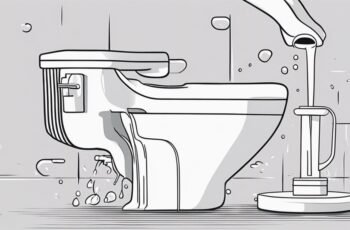Picture your septic tank odor as a lingering guest at a party – unwelcome and persistent. You're tired of masking the smell with temporary solutions.
What if there was a way to bid farewell to this unwelcome visitor for good, leaving your space fresh and clean? Discover the key strategies and insider tips to tackle septic tank odor head-on, ensuring a long-lasting solution that will have you breathing easy once again.
Key Takeaways
- Conduct routine inspections and maintenance to prevent septic tank odor.
- Address issues promptly, such as leaks and blockages, for odor control.
- Utilize odor neutralizers and ensure proper ventilation in the system.
- Implement proactive measures like regular pumping and beneficial bacteria additives for odor elimination.
Understanding Septic Tank Odor

To understand septic tank odor, you must first grasp the interactions between anaerobic bacteria and waste decomposition within the system. Odor sources in a septic tank primarily stem from the breakdown of organic matter by anaerobic bacteria. These bacteria thrive in an oxygen-deprived environment, breaking down waste into byproducts like hydrogen sulfide, which emits a foul odor. Additionally, volatile organic compounds and ammonia produced during the decomposition process contribute to the unpleasant smell emanating from the tank.
Odor mitigation strategies focus on controlling the production and release of these malodorous compounds. Proper maintenance, such as regular pumping to remove accumulated sludge, ensures that the decomposition process remains efficient and minimizes odor production. Ventilation systems can also be installed to facilitate airflow and reduce the buildup of gases inside the tank. Furthermore, using additives containing beneficial bacteria can help improve waste breakdown and reduce odor formation.
Common Causes of Odor
Understanding the common causes of odor in a septic tank involves identifying key factors that contribute to the production of foul-smelling compounds within the system. Septic tank maintenance plays a crucial role in preventing odor issues. One common cause is a lack of regular pumping, which leads to the accumulation of solid waste and sludge in the tank. When these materials build up, they can produce noxious gases that escape through the plumbing vents and cause unpleasant odors.
Another factor that can contribute to septic tank odors is a malfunctioning or damaged system. Cracks in the tank, broken pipes, or a faulty septic tank lid can allow odors to escape into the surrounding environment. It's essential to perform routine inspections to detect any issues early on and address them promptly.
Odor detection is a vital part of septic tank maintenance. If you notice a persistent foul smell around your property, it's crucial to investigate the source and take action to prevent further issues. Regular maintenance and timely repairs can help eliminate septic tank odors and ensure a clean and odor-free system.
Effective Odor Control Solutions

For effective control of septic tank odors, implementing proactive maintenance measures is crucial to prevent foul-smelling compounds from forming and escaping into the environment. To tackle septic tank odors head-on, consider the following odor control solutions:
- Odor Neutralizers: Utilize specialized odor neutralizers designed to break down and eliminate the unpleasant smells emanating from your septic system.
- Septic Tank Ventilation: Ensure proper ventilation of your septic tank system to allow for the release of gases and prevent odors from building up inside the tank.
- Regular Inspections: Conduct routine inspections of your septic tank to identify any potential issues early on and address them promptly to prevent odor problems.
- Professional Pumping: Schedule regular professional pumping of your septic tank to remove accumulated sludge and prevent odor-causing compounds from lingering in the system.
Maintenance Tips for Odor Prevention
Implementing regular maintenance procedures is essential for effectively preventing odors in your septic tank system. Routine inspections are crucial to catch any potential issues early on. Make sure to inspect the tank, pipes, and drain field regularly for any signs of leaks, blockages, or damage. Addressing these issues promptly can prevent odors from becoming a problem.
Proper ventilation is another key aspect of odor prevention. Ensure that your septic tank system has adequate ventilation to allow gases to escape properly. Consider installing vents or fans if needed to improve airflow.
Additionally, be mindful of what you flush down your drains. Avoid putting grease, chemicals, or non-biodegradable items into your system, as these can contribute to odors and clogs.
Conclusion
To permanently eliminate septic tank odor, follow the effective odor control solutions and maintenance tips outlined in this guide.
By taking proactive steps to address the common causes of odor, you can ensure a fresh and odor-free environment around your septic tank.
Trust me, with dedication and proper maintenance, you can banish septic tank odor once and for all, leaving your surroundings smelling as fresh as a field of blooming flowers on a spring morning.

